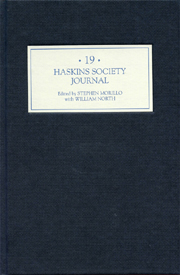Book contents
- Frontmatter
- Contents
- Editor's Note
- Abbreviations
- 1 King Harold's Daughter
- 2 The Anglo-Saxon Chronicles, Identity and the Making of England
- 3 Master Arnulf, Archdeacon of Rouen, Unlicensed Pluralism, and Idoneitas. Defining Eligibility in the Early Thirteenth Century
- 4 The Saint Zenobius Dossal by the Master of the Bigallo and the Cathedral Chapter of Florence
- 5 Discovering the Aquitanian Church in the Corpus of Ademar of Chabannes
- 6 Robert de Londres, Illegitimate Son of William, King of Scots, c.1170–1225
- 7 The Use of Naval Power in the Norman Conquest of Southern Italy and Sicily
- 8 Apology, Protest, and Suppression: Interpreting the Surrender of Caen (1105)
- 9 Henry Loyn and the Context of Anglo-Saxon England
3 - Master Arnulf, Archdeacon of Rouen, Unlicensed Pluralism, and Idoneitas. Defining Eligibility in the Early Thirteenth Century
Published online by Cambridge University Press: 12 September 2012
- Frontmatter
- Contents
- Editor's Note
- Abbreviations
- 1 King Harold's Daughter
- 2 The Anglo-Saxon Chronicles, Identity and the Making of England
- 3 Master Arnulf, Archdeacon of Rouen, Unlicensed Pluralism, and Idoneitas. Defining Eligibility in the Early Thirteenth Century
- 4 The Saint Zenobius Dossal by the Master of the Bigallo and the Cathedral Chapter of Florence
- 5 Discovering the Aquitanian Church in the Corpus of Ademar of Chabannes
- 6 Robert de Londres, Illegitimate Son of William, King of Scots, c.1170–1225
- 7 The Use of Naval Power in the Norman Conquest of Southern Italy and Sicily
- 8 Apology, Protest, and Suppression: Interpreting the Surrender of Caen (1105)
- 9 Henry Loyn and the Context of Anglo-Saxon England
Summary
Master Arnulf, archdeacon of Rouen, belongs to the obscure figures of history. The sources reveal very little about the man, his life, and his career. Arnulf is traceable in the first half of the thirteenth century, between 1223 and late 1235. Nothing is known about his place of origin and his family. His title and, as we will see, his great expertise in canon law suggest that at some point in his career he studied law. Perhaps he did so in Paris, where he appears to have spent some time. In 1228, he was said to be ‘staying in Paris’, when he, together with two other judges settled a dispute with which they had been charged by the papal legate in France, Roman, cardinal-deacon of S. Angelo. An entry in the obituary of the abbey of St Victor, Paris, may also indicate Arnulf's link with the city on the Seine. A Master Arnulf, archdeacon of Rouen, who retired to the abbey of St Victor, is commemorated there on 31 March. This Arnulf may well be identical with the protagonist of this article, for the extensive research on the Rouen cathedral clergy has revealed no second archdeacon of Rouen named Arnulf. A good deal of the information on Arnulf's activities stems from the registers of Pope Gregory IX. They show that Arnulf had a special interest in eradicating pluralism. His most notorious case was his appeal against the election of Thomas de Fréauville to the archiepiscopal see of Rouen in 1230/1.
- Type
- Chapter
- Information
- The Haskins Society Journal 192007 - Studies in Medieval History, pp. 51 - 64Publisher: Boydell & BrewerPrint publication year: 2008

